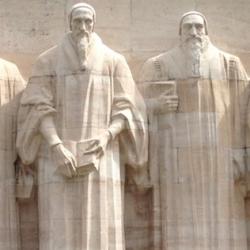One chapter of Emmanuel Katongole’s A Future for Africa is a critique of the Ugandan Movement for the Restoration of the Ten Commandments of God (MRTCG). He argues that the movement has a “tendency toward isolation,” fails “to reimagine the nature of Christian leadership,” and exhibits a “lack of hope” (129). His proposed reforms include openness to strangers, leadership understood as service, and the formation of “a Eucharistic community of forgiveness and hope” (129).
The last two are closely connected: Eucharistic practice is one of the ways to imagine fresh forms of leadership. Not just any Eucharistic practice will do. Katongole insists that it is essential for Eucharistic revival to avoid what William Cavanaugh calls the “cult of the host” (140).
Katongole gives this insightful commentary on how the MRTCG practices Eucharist: “the MRTCG cult of the host seems to have been drawn greatly from a long-standing Catholic tradition that limits the reception of Communion to Christians who are ‘worthy.’ This practice has had negative consequences in Africa, where many Catholics, who for various reasons think they are not ‘pure’ or find themselves ‘in sinful situations,’ are effectively excluded from the Eucharistic table. In some cases, Eucharistic ministers literally pull those suspected by being ‘unworthy’ out of Communion lines to ensure, as was once explained to me by a zealous catechist, that ‘children’s food is not thrown to the dogs’” (139-40). As a result, “the Eucharist becomes a kind of reward or privilege that ‘deserving’ Christians . . . receive, while the undeserving ones are reduced to envious spectators” (140).
Church discipline is one thing; erecting a fence around the table so high that none but spiritual athletes can vault it is quite another.
MRTCG “radicalized” this view of the Eucharist by insisting that everyone receive “Communion on the tongue while kneeling. The posture becomes the ultimate sign of holiness, obedience, and surrender.” It also ritually embodies a certain understanding of leadership: In this Eucharistic posture “one detects the same politics of power, privilege, and personal aggrandizement” that is evident in the group’s view of leadership. Katongole claims that “the only difference is that in relation to the Eucharist, the politics of power and privilege now assume a ‘spiritualized’ and more generalized form.” The leadership of the leaders is sanctified by the Eucharist itself, and “the unfortunate effect of this development . . . is that the Eucharist ceases to be regarded as a practice that institutes and disciplines Christian hope, and simply becomes an object of purity, power, and privilege” (140).
Katongole’s comments are directed at a specific target, but have a much more general application.














